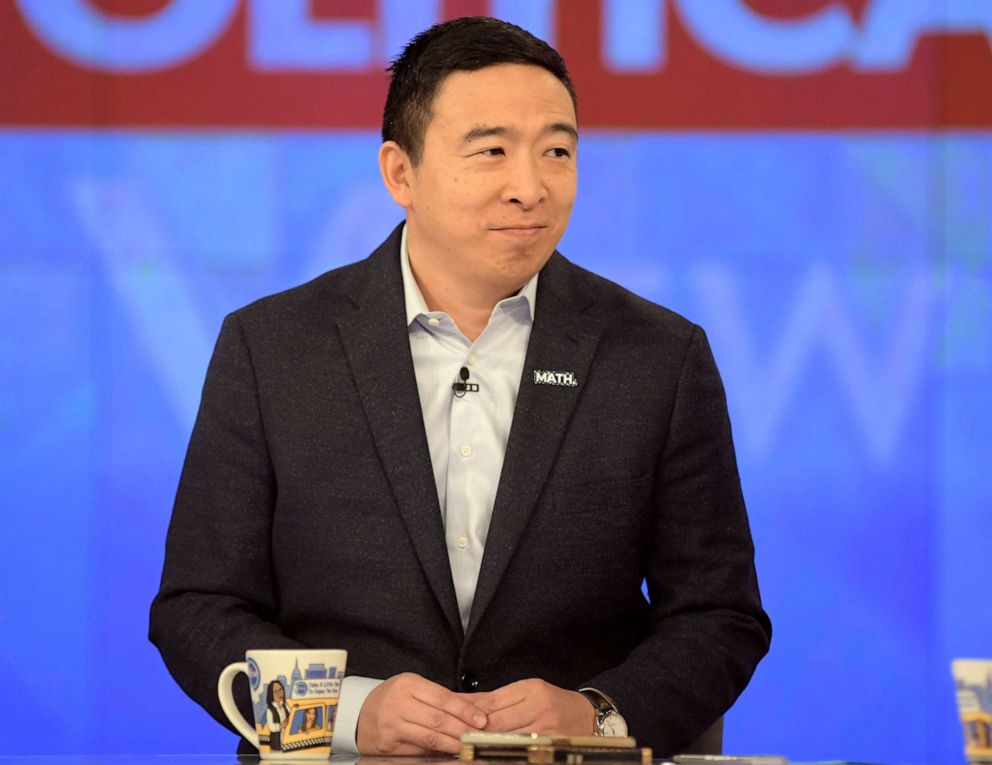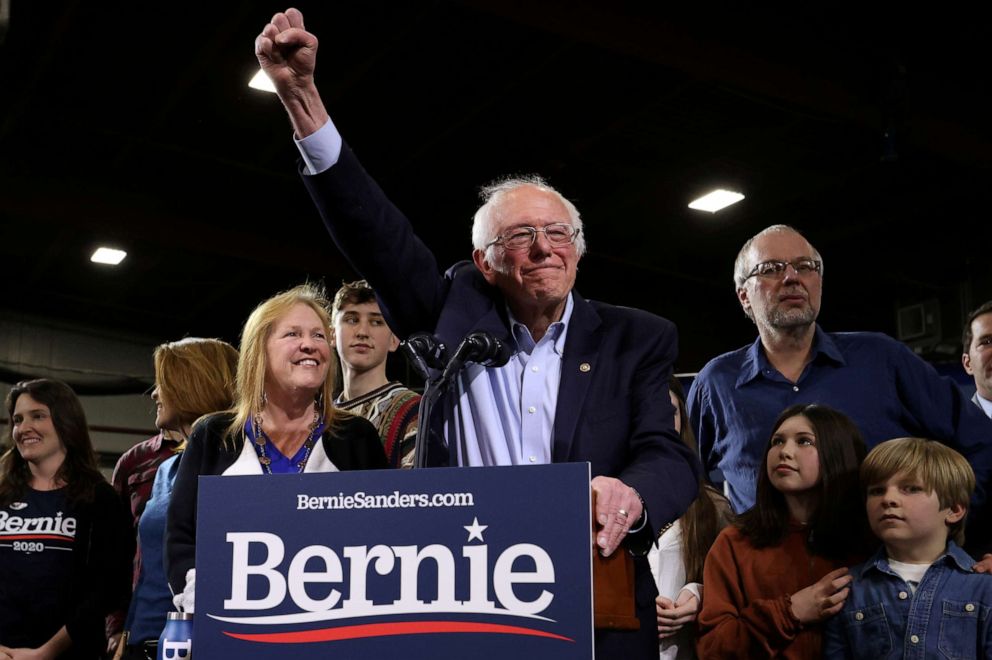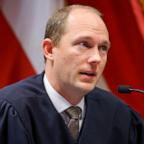Judge rules New York must hold presidential primary after cancellation by state election officials
The state's presidential nominating contest is slated for June 23.
The Democratic presidential primary might be settled, with former Vice President Joe Biden marching towards the nomination unencumbered, but in New York, after bitter intraparty feuding and some legal wrangling, the second-most delegate rich state's presidential nominating contest is back on, for now.
A federal judge in the Southern District of New York ordered election officials late Tuesday night to restore the presidential primary, set for June 23, and reinstate all the former candidates on the ballot who were previously removed as a result of suspending their campaigns.
In late April, New York state election officials nixed the Democratic presidential primary, citing the threat of the coronavirus, a controversial move that inflamed supporters of Vermont Sen. Bernie Sanders, the last contender to concede to Biden, and the progressive wing of the party.
The decision to forgo the primary entirely immediately prompted a legal challenge from a former presidential candidate, Andrew Yang, among other plaintiffs, who were seeking to be Yang delegates at the convention.
The lawsuit contended that election officials were disenfranchising voters by barring them from exercising their right to vote in the presidential contest. More than a dozen Sanders delegates also petitioned to intervene in support of Yang's suit late last week.
In the ruling, U.S. District Judge Analisa Torres wrote that a primary for the nation's highest office is not only about the nomination, but also about the delegates who seek to hold sway over the party.
"The removal of presidential contenders from the primary ballot not only deprived those candidates of the chance to garner votes for the Democratic Party’s nomination, but also deprived their pledged delegates of the opportunity to run for a position where they could influence the party platform, vote on party governance issues, pressure the eventual nominee on matters of personnel or policy, and react to unexpected developments at the Convention," she wrote in the order. "And it deprived Democratic voters of the opportunity to elect delegates who could push their point of view in that forum."
A spokesperson for the New York State Board of Elections declined to comment on the ruling, but said that "our lawyers are reviewing the decision."
New York Gov. Andrew Cuomo, when asked by his brother, CNN anchor Chris Cuomo, about the status of the primary, said the contest is happening "right now, by a judge's determination," but added that the decision "could be appealed." Cuomo, though, is not a party to the suit.
Yang lauded the judge's order, writing in a tweet, "I hope that the New York Board of Elections takes from this ruling a newfound appreciation for their role in safeguarding our democracy."

The Sanders campaign also applauded the ruling, with campaign manager Faiz Shakir saying in a statement, "We’re glad Judge Torres has restored basic democracy in New York. People in every state should have the right to express their preference in the 2020 Democratic primary. We have confidence that New York can hold elections in June in a safe manner that preserves New Yorkers’ right to vote."
The initial decision by the state board of elections in the second-most delegate-rich state came before a panel comprised of only the two Democratic commissioners on the New York State Board of Elections, co-chair Doug Kellner and commissioner Andrew Spano, the latter of which was appointed by Cuomo in 2014.
Both voted to effectively scrap the primary early last week, by allowing for all candidates no longer in the 2020 race to be removed from the ballot, making Biden the de-facto winner of the nominating contest and enraging progressives.
"This is beyond outrageous," said Larry Cohen, the chairman of Our Revolution, the nonprofit offshoot that spun out of Sanders’ 2016 presidential campaign, in an interview with ABC News on Tuesday before the judge's ruling. "Right now, New York is gonna have no delegation to the Democratic convention...the party requires a primary or Democratic caucus. You can't send a delegation without a primary or a caucus."
"This is not Tammany Hall," he added.
Other progressive leaders in the state, too, scoffed at the move, calling it "infuriating."
"New York is the only state now cancelling a primary, when there's still two people that have not requested to be taken off the ballot," said Jay Bellanca, co-chair of the New York Progressive Action Network, and a plaintiff in the lawsuit challenging the board's decision. "Before all this ridiculous business, you could never get off the ballot in New York. Even if you were dead, you wouldn't be taken off the ballot."
Both Kellner and Spano said their unanimous decision was in response to the coronavirus, and was the right step to protect voters from the risk of the outbreak. But on June 23, New York state is not only holding a presidential contest but also a number of down-ballot primaries.

The decision to cancel the primary only affected 20 counties across the state, according to Dustin Czarny, the Democratic caucus chair for the New York State Elections Commissioner Association. In the other 42, even without a presidential race appearing on the ballot, voters were still set to head to the polls.
Torres, in the ruling, acknowledged the threat of the pandemic, before rebuffing the argument from state election officials.
"Protecting the public from the spread of COVID-19 is an important state interest. But the Court is not convinced that canceling the presidential primary would meaningfully advance that interest," she wrote.
The legal whiplash reflects much of the uncertainty the coronavirus injected into this cycle's electoral process. Earlier this year, confusion marred Wisconsin's primary after Democratic Gov. Tony Evers issued an executive order delaying in-person voting until early June on the eve of the election.
The abrupt move was a reversal for the governor and was swiftly challenged by top state Republican lawmakers, who filed a motion with the state Supreme Court. Within hours, the conservative-leaning bench blocked Evers’ order in a 4-2 decision.
Before the vote in New York, Sanders’s campaign urged the board in a letter to keep his name on the ballot, arguing it would further sow discord within a party desperately seeking unity.
A senior advisor to Sanders, Jeff Weaver, called the outcome of the vote an "outrage," warning that it sets a dangerous "precedent" for November’s general election and strips the Vermont senator and the progressive movement of a key opportunity to influence the party at the Democratic National Convention.
Despite his formal exit from the race, Sanders and his allies are hoping for him to stay on the ballot and continue to corral delegates in order to cultivate leverage for the convention and potentially solidify Sanders' priorities in the party’s platform and rules in August.
Late last week, the Biden and Sanders campaigns reached an agreement, allowing Sanders to retain delegates he would have otherwise had to forfeit due to Democratic National Committee rules - in a significant overture to unify the party ahead of November and mend any lingering divides between the moderate and progressive wings.
The memo outlining the agreement also specifically mentions the New York decision, and states "if the state remains eligible for delegates, the campaigns are committed to working together to ensure representation for Senator Sanders in the New York delegation."
But Cohen argued the impact of the state board of elections' decision goes far beyond Sanders, telling ABC News, "This isn't about Bernie Sanders at this point. This is about democracy, and it's about party building in a democratic way."
Both Democrats who backed Sanders in the primary view the board's unprecedented decision as a politically motivated slight against the progressive movement.
"This is just a move to suppress the progressive vote, in my opinion," Bellanca asserted.

Cohen, a member of the DNC for 15 years who was also the vice chair of the Unity Reform Commission, which overhauled some of the national party's rules, including limiting the role of superdelegates in the primary process, after the 2016 election, went further, faulting Cuomo for the board's decision.
"Governor Cuomo is the origin," he continued. "There's no question about it. I wasn't shocked that Gov. Cuomo has stuffed the authority for the board of elections to do this in a budget bill during a pandemic. This is the way he plays politics."
The governor's office vehemently rejected the notion that Cuomo was involved or that it was politically motivated, with Rich Azzopardi, a senior advisor to Cuomo, telling ABC News, "This was the board of elections' decision and there's alone. We're too busy fighting a pandemic to deal with dark conspiracies, especially poorly thought out ones."
Sparking the entire debate over New York's primary is a provision that was tucked into this year's budget bill, which was signed in early April by Cuomo after passing both chambers in the state legislature. The measure empowered the commissioners to remove the names of candidates who suspended their campaigns from the ballot.
Shortly after the board voted, Cuomo told reporters during a daily briefing on the coronavirus he would not stand in the way of the board's decision.
"I’m not going to second guess the board of elections. I know there are a number of election employees who are nervous about conducting an election but I’ll leave it up to the board of elections," he said on April 27.




